by Wolfgang H. O. Dorow, 21.02.2021
My father Willi was born 2nd August 1924 at the little town Belgard in Pommerania, which today is located in Poland and named Bialogard. He was working at an office of the German railways and was offered an administrational job in the city of Stettin (poln.: Szczecin). This was a crucial fact in his life, because all young men from Belgard were sent to the “east front” in Russia, which only very few survived.
As a resident of Stettin, Willi was sent to East Prussia in autumn 1942 for basic training and afterwards to the far north of Norway. About one year later his military troop was ordered to support the troops at the east front in Russia, but already on the vessel they got the information, that they would be sent to France instead. So he – for the second time – could escape his sentence for death. In France he finally was based close to Le Havre, where he served in the “245 ID, 10. Grenadier-Regiment 936” from October 1943 to 11th September 1944, first in the office, later as corporal and group leader. Willi saw the invasion of the allied forces at the opposite (southern) part of the bay of Le Havre, but they did not involve in active fighting due to the fact that their heavy cannonry as well as their speedboats had been destroyed before by fighter-bombers. Instead they were ordered away from the front to the hinterland of Le Havre. On 11th September 1944 Willi’s military unit was captured by Canadian troops, who were wearing a polar bear emblem (was Willi wrong and that was the 49th (West Riding) Infantry Division, i.e., a British unit? – I could not find other polar bear division badges on the internet). At the time of his capture he was an infantryman with the rank of a corporal. His prisoner number was B 22063 and A 22063, his military identification tag (“Erkennungsmarke”): B – 374 – – Stamm Kp. J.E.B. 478. With trucks they were carried to a reception camp in Dieppe, where they fortunately had to stay only from 11th – 20th September 1944 in cold weather with heavy rain on the open field. From there they were brought to a “tent camp in London on a racecourse” (probably 9. Kempton Park Racecourse, Sunbury-on-Thames, Middlesex, England or less probable 7. Winter Quarters Camp, Ascot Racecourse, Berkshire) and from there to 22. Pennylands Camp, Cumnock, Ayr, Ayrshire, south of Glasgow, Scotland, where he stayed from 21st September 1944 to August 1945. This camp was far outside the village. It already existed during the time of World War I and had 2000-5000 prisoners of war. Willi joined educational courses (e.g. English), but did not work. According to his letter from 13th April 1945 only volunteers were working during that time. From there he was transferred to 75. Northern Hill (Northhill) Camp, Laurencekirk, Kincardineshire, Scotland.
Willi did not talk much about war to us children, although he spent a relatively uncomplicated time without any active fighting during a war with millions of deaths. But about his time at Cumnock and especially Laurencekirk he invariably had very positive memories and told us lots of stories and anecdotes about Laurencekirk. The only problem for him was, that no messages from his parents arrived, although several of his POW comrades already had received letters and he did not know whether they had been evacuated or already were dead.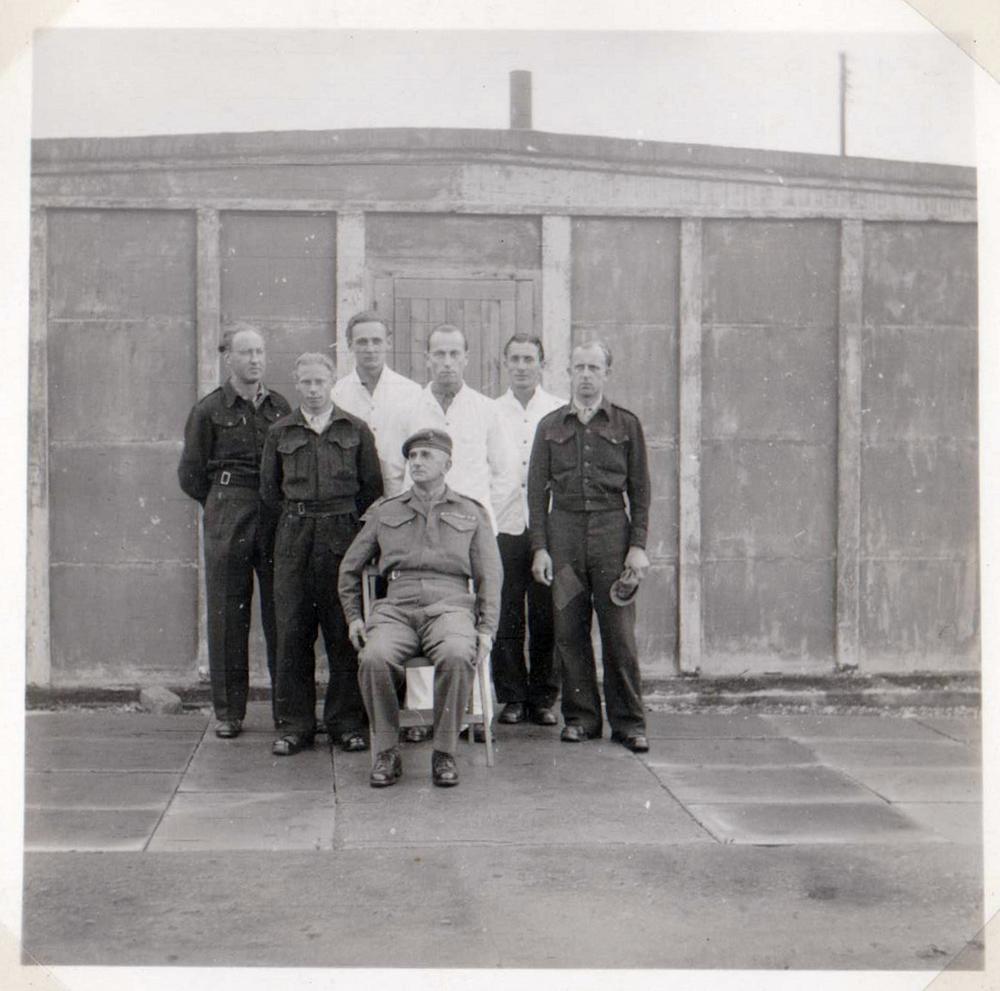
At Laurencekirk Willi was housed in barrack 7, together with 9 other POW’s, including Herbert Lange, Walter Neugebauer (date of birth 20th September) and Eberhard Schneider, who became friends. Willi had a weak stomach and got sick, when driving in a vehicle. Therefore he was allowed to work as ordinance of the camp commander, an old Irishman (at the back of his photo is written “Thomas Reilly LT, 12.1.91, Far Hills, Killiney, Co. Dublin, Eire”), who was a very friendly person, always abiding to the international rules for handling prisoners of war. Willi also sometimes worked, as many of the other POWs, at the farms in the neighbourhood of the camp, although he was not ordered to do. A countrywoman, astonished about that, asked, why he was doing that. Willi, during that time already with only a few hairs left and never shy for an amusing answer, replied with his limited English, which he had learnt as POW “I need water for my hair” (meaning hair tonic). The farmers around the camp must have had a very good sense of humour and surely they were long-suffering, because, as my father told me, some of his fellow POW’s sometimes fooled around, e.g. fixing the horses with the horse’s harness in the wrong way to the carriage (face to carriage).
The fellow POW’s in barrack 7 were also allowed to keep a large black Labrador dog, named “Moritz”. The dog was a quite horny creature with a very excellent sense of smell. When a female dog was in heat at one of the farms around, he escaped from the camp and usually returned many hours later completely groggy. Once a farmer in the neighbourhood accused Moritz of hunting sheep and demanded his death. But the Irish commander arranged an on-site inspection, where clearly could be shown, that Moritz was not the sheep hunter. Once the Labrador saved Willi while swimming in a stream. Willi could not get out because of a high and dense vegetation at the margins and panicked, but Moritz found a way out. The prisoners were also allowed to keep a wounded crow, which made friends with the dog. When the prison camp was closed, the fellow soldier Jakub van der Strot (or Straat) kept Moritz. When I keep it correctly in mind, Jakub had decided to stay in Laurencekirk or nearby. [Does anyone know whether someone with this family name, Strot or Straat or similar is still living around here? Please leave a comment below.]
At the camp they were also allowed to establish a group of amateur actors, a handball and a soccer team.
When the Irish commander retired, a new commander followed, who was a womaniser. He especially liked to be driven to an estate, where an old Lord had a young wife. The old lord had a big heart and left the house at the backdoor for a promenade with his walking stick, when the young commander arrived. Willi received a pair of cuff buttons from the lady – why, will be his secret for ever.
At 16. July 1947 David Young, Meadow House, Dundee, Scotland made a nice gift to him: a small booklet in German language with the Gospel according to Mark.
Willi noted in his calendar, that he was repatriated on 3rd April 1948 by ship from Harwich (13:30 o’clock) to Germany, where he arrived at 4th April 1948 at 7:00 o’clock. First he had to stay at Nr. 1 POW Transit Camp in Munster Lager. On 6. April 1948 he was released from prisonership and went to Hannoversch Münden, a town in the Britischen Sector in Germany. On 4th May 1948 he was officially discharged from the army. German railways already had contacted Willi in the prisoner camp because they wanted to have him in Frankfurt am Main. So he did not stay in the British Sector, but relocated to Frankfurt on 7th June 1948, where he met my mother and lived there until 2019, when he unfortunately died at the age of 95 years. The contacts to his old fellow soldiers from Laurencekirk disappeared over the time and Willi unfortunately never saw Laurencekirk again. His friend Herbert Lange lived in Eckernförde, Eberhard Schneider in Remscheid.
Photos and documents:
Plate 1:
Left: Willi (second from the right) during the time of his basic training at Schwedt/Oder (a town at the eastern border of Germany in the province of Brandenburg at the river Oder)
Centre: Willi, spring 1944 in France
Right: Willi January 1943 in northern Norway
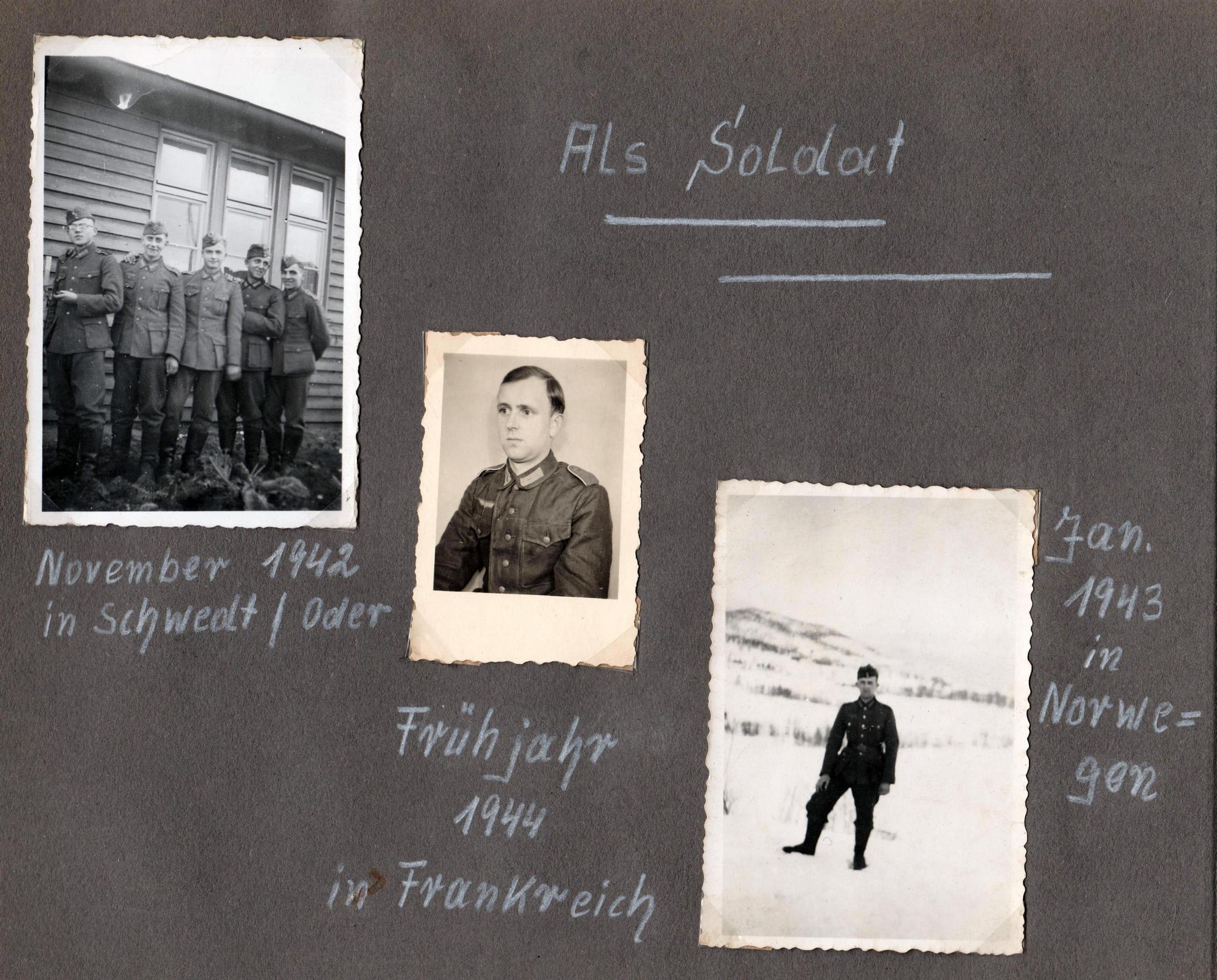
Plate 2:
Our company sergeant major (the official German name for “Spieß” is “Kompaniefeldwebel”) of 10. Gren. Reg. 936 and his burial. He was the first in Willi’s unit, who died (killed at his bicycle by a low-flying plane attack).
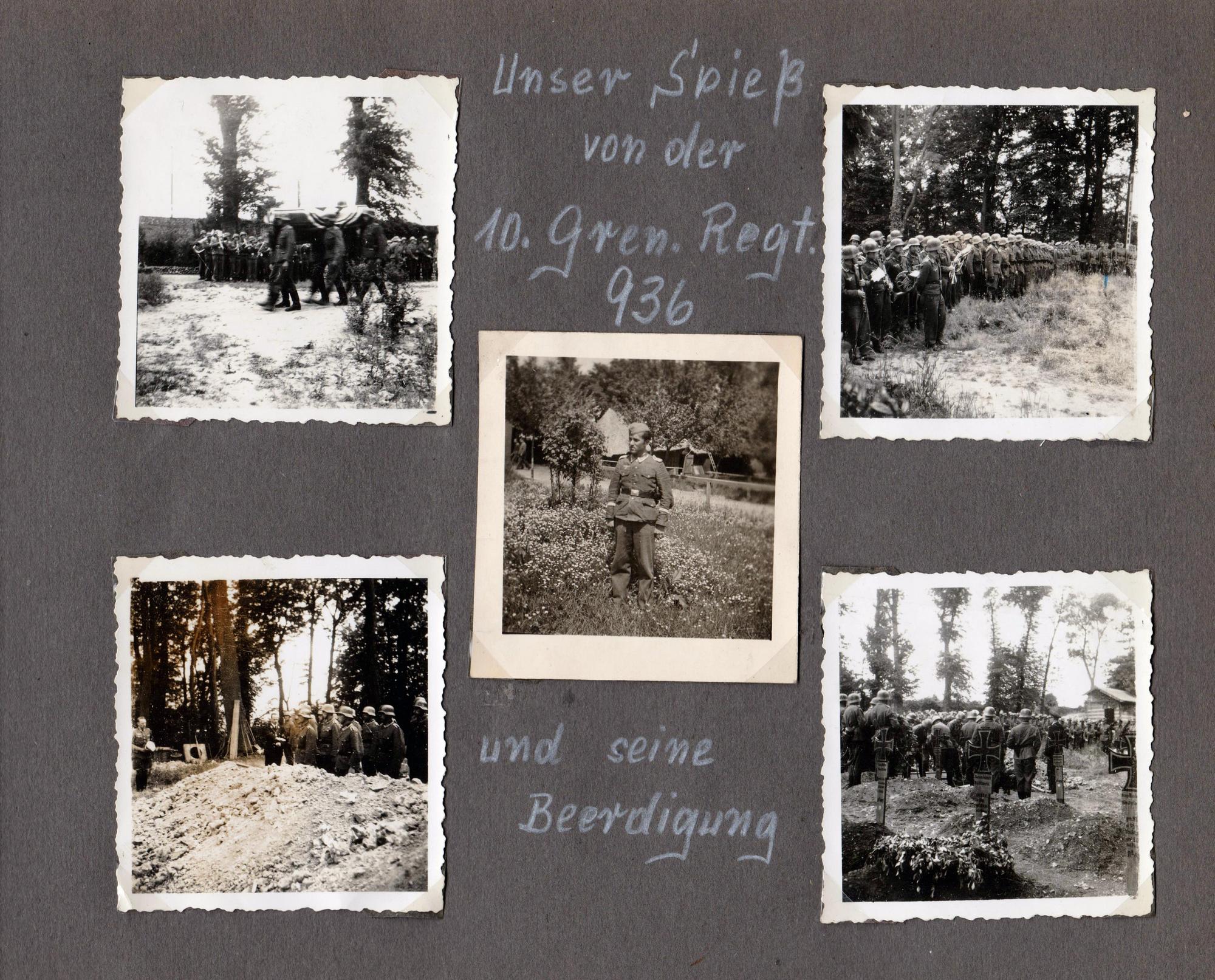
Plate 3:
POW Camp 75, Laurencekirk, Scotland
In the centre: the Irish commander, at the back of his photo is written “Thomas Reilly LT, 12.1.91, Far Hills, Killiney, Co. Dublin, Eire”
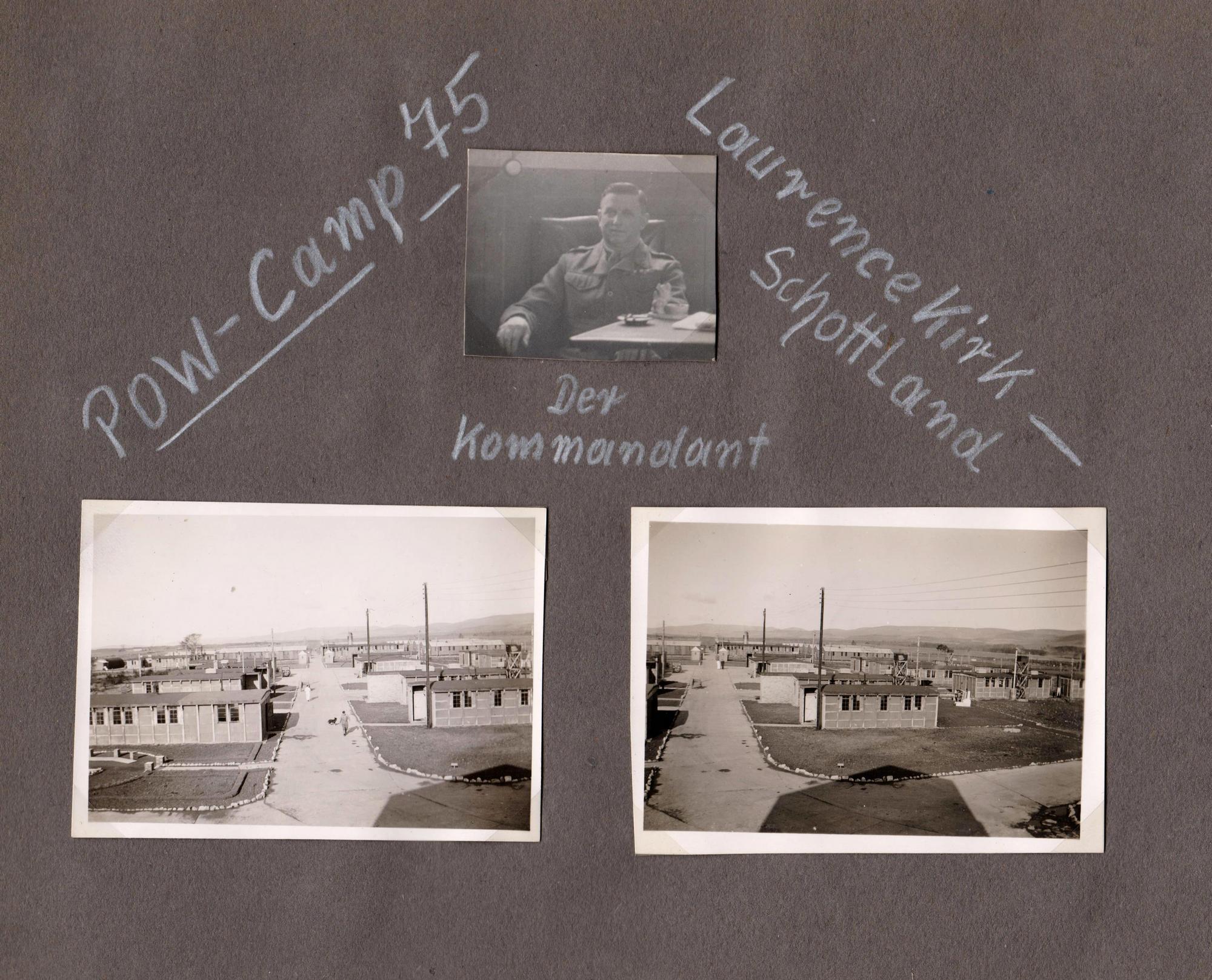
Plate 4:
In the camp
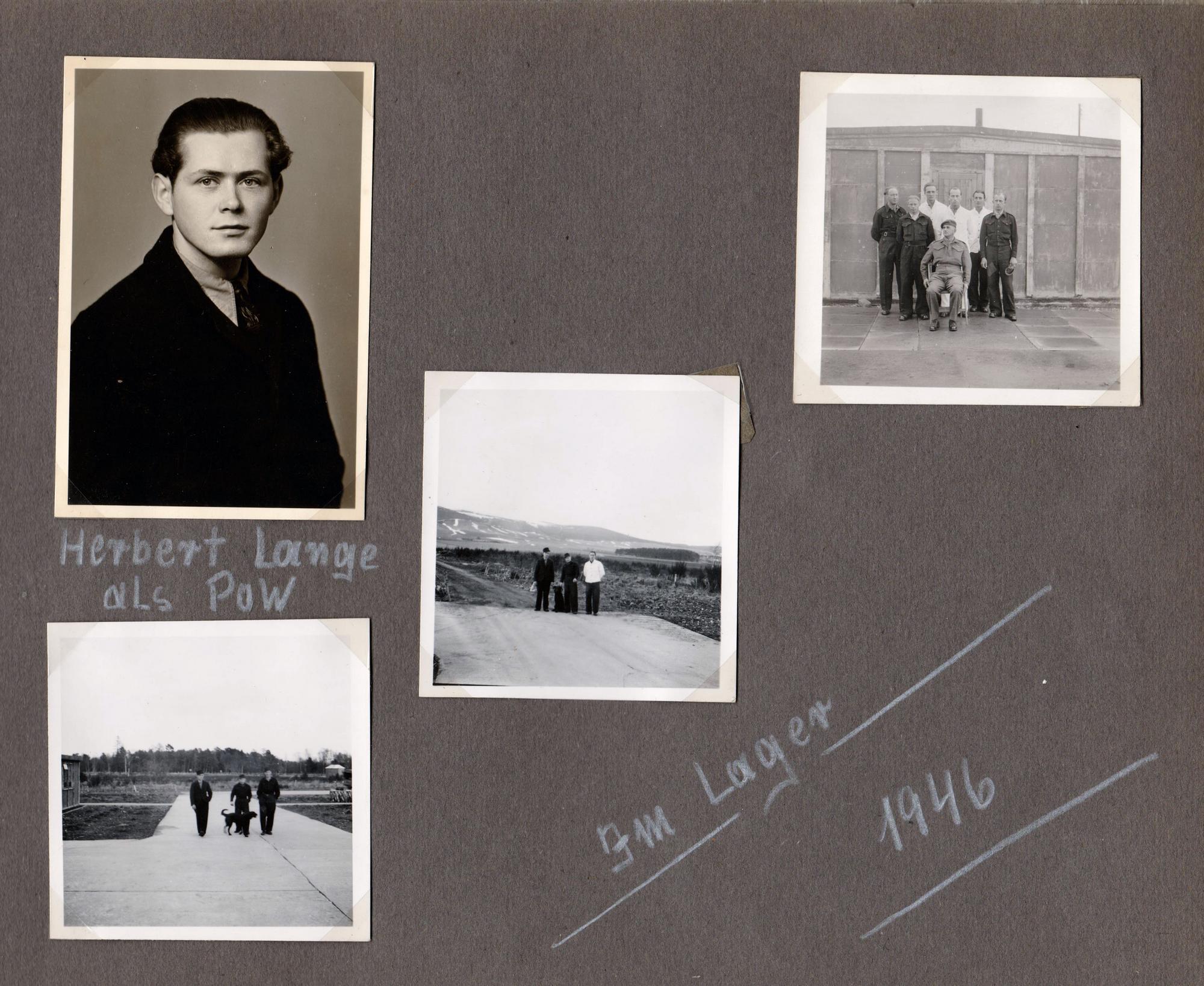
Plate 5:
In the camp with our (dog) Moritz
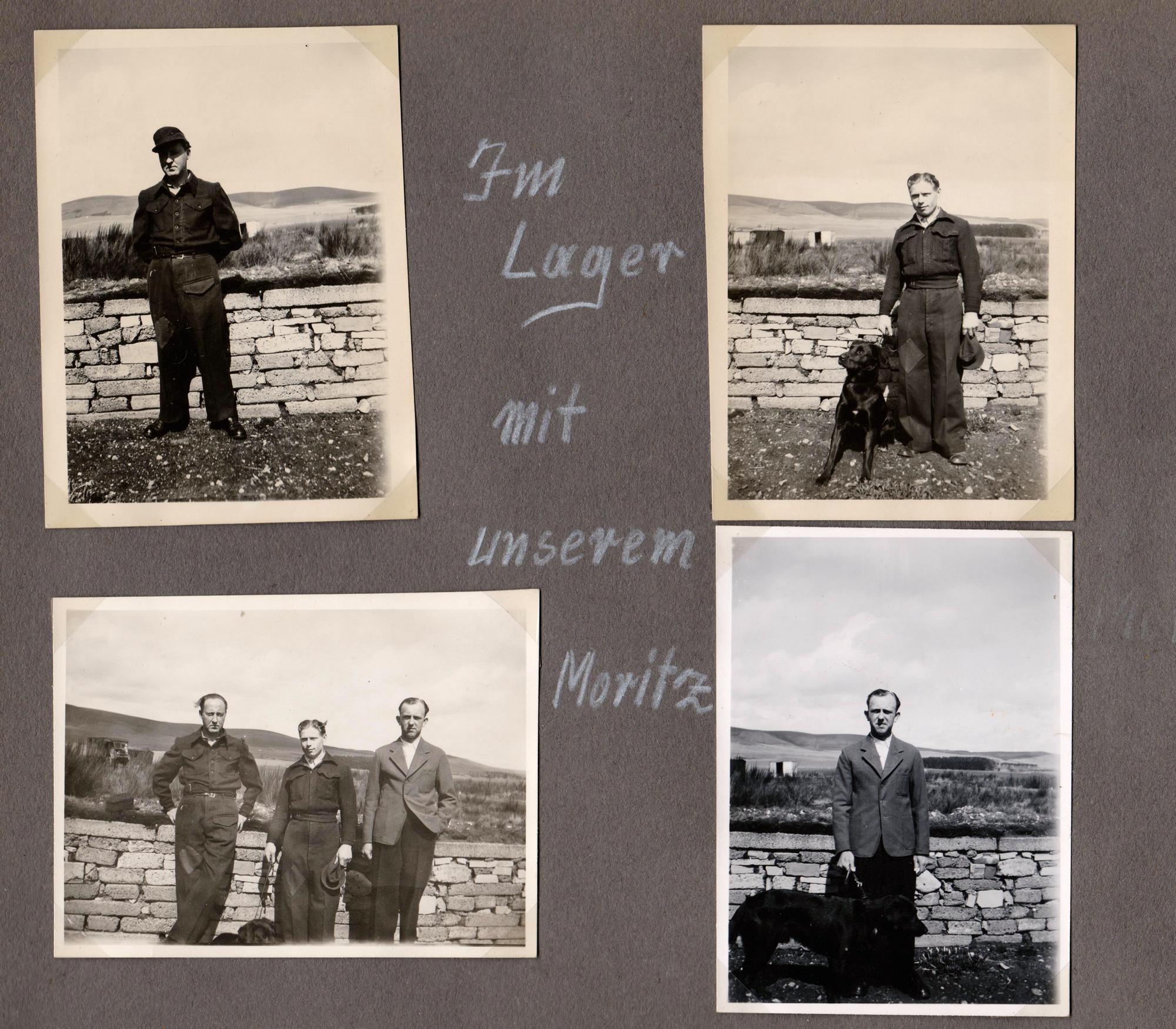
Plate 6:
Left: POW’s from the city of Stettin
Right: the 3 guys
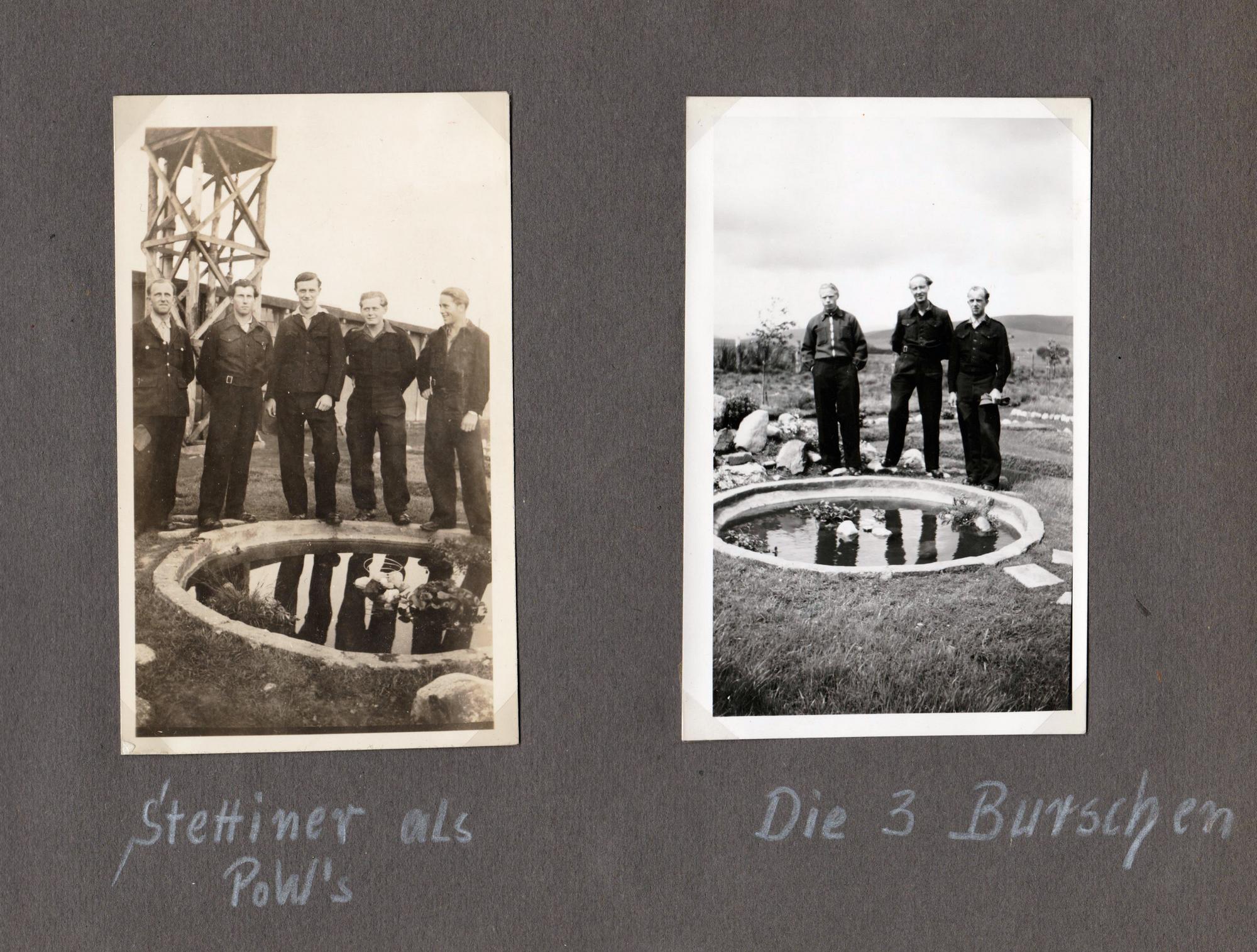
Plate 7:
Top left: officer’s cooks
Top right: at the dentist
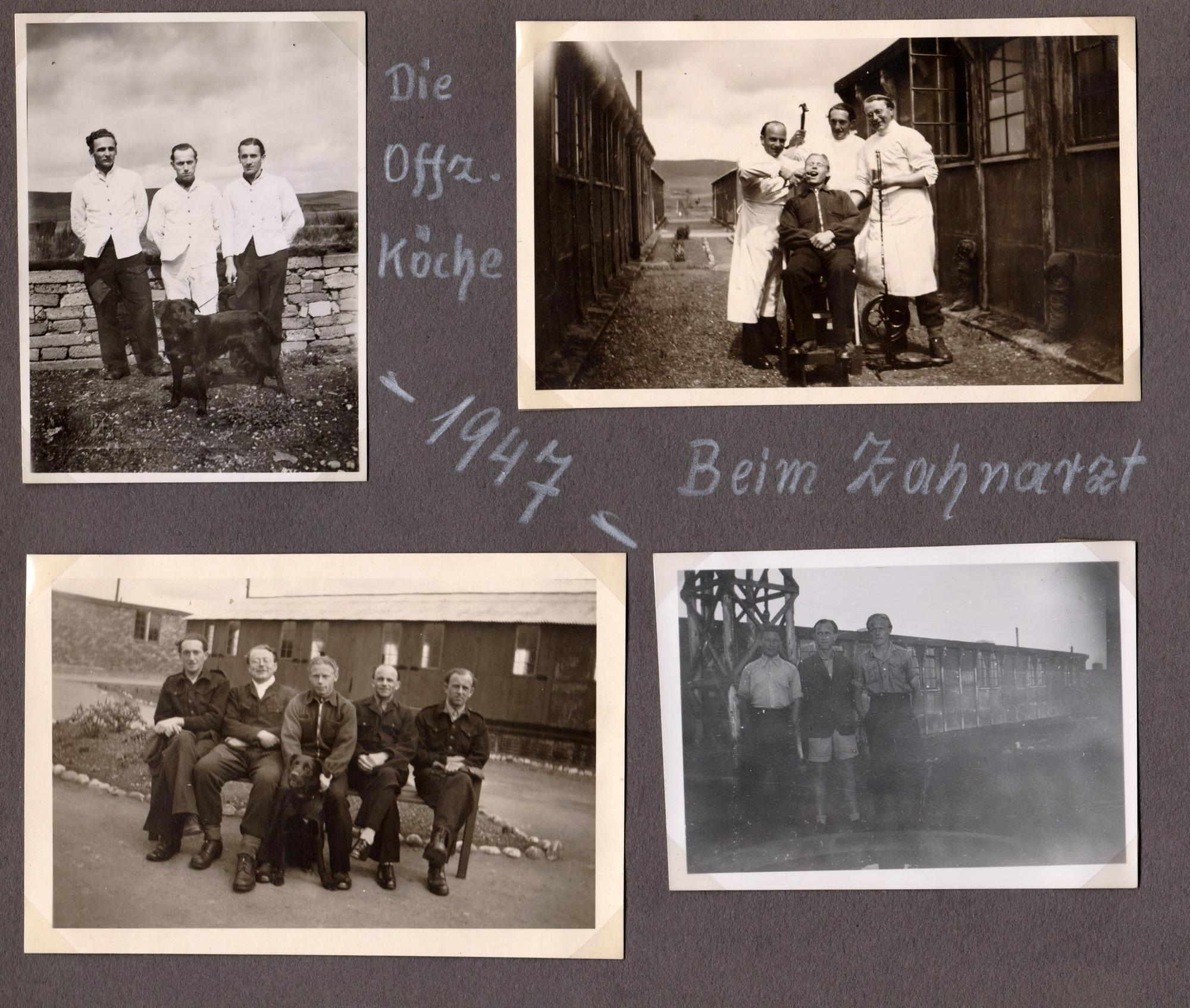
Plate 8:
Comrades of barrack 7
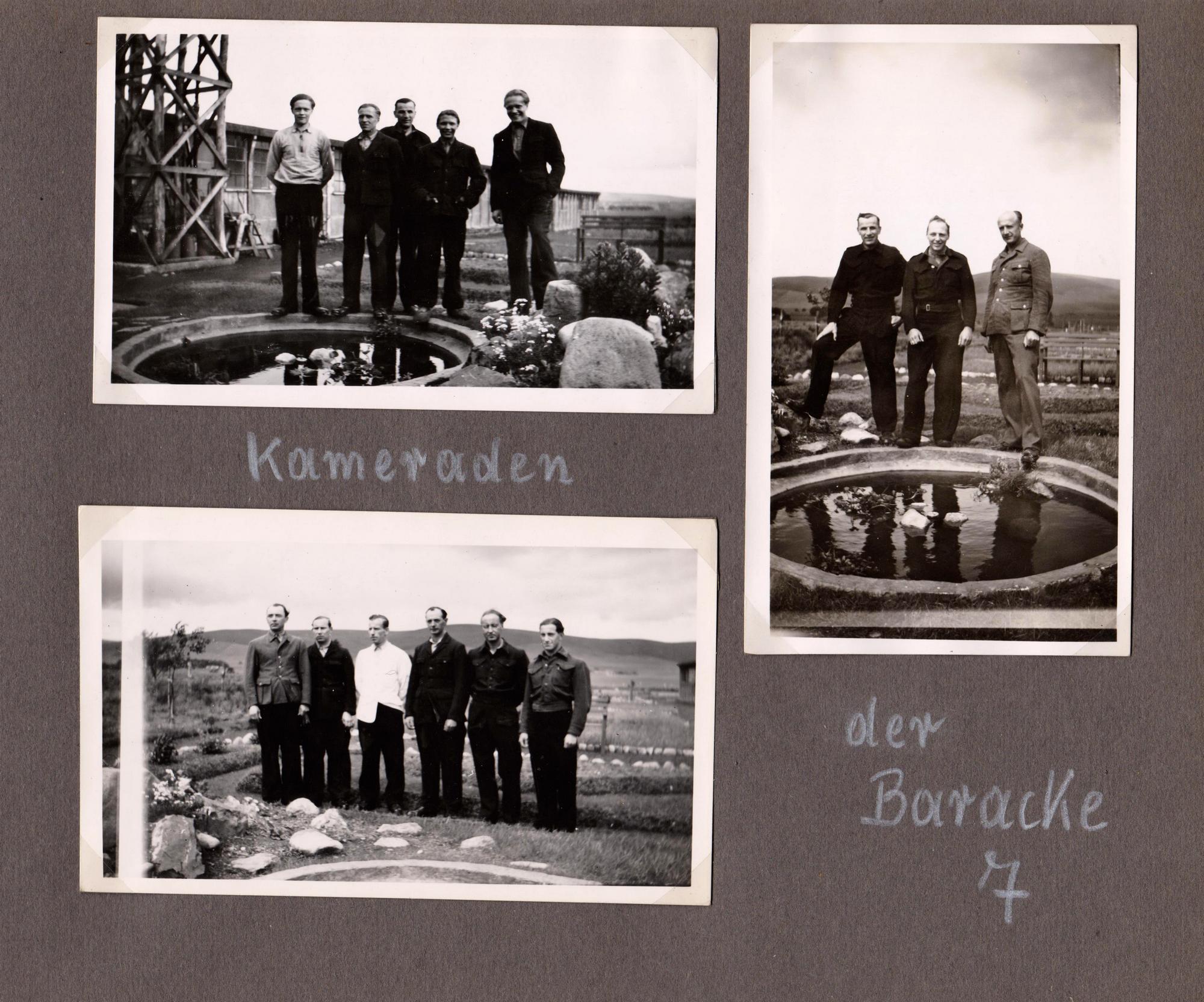
Plate 9:
Top: group of amateur actors
Bottom: our handball team
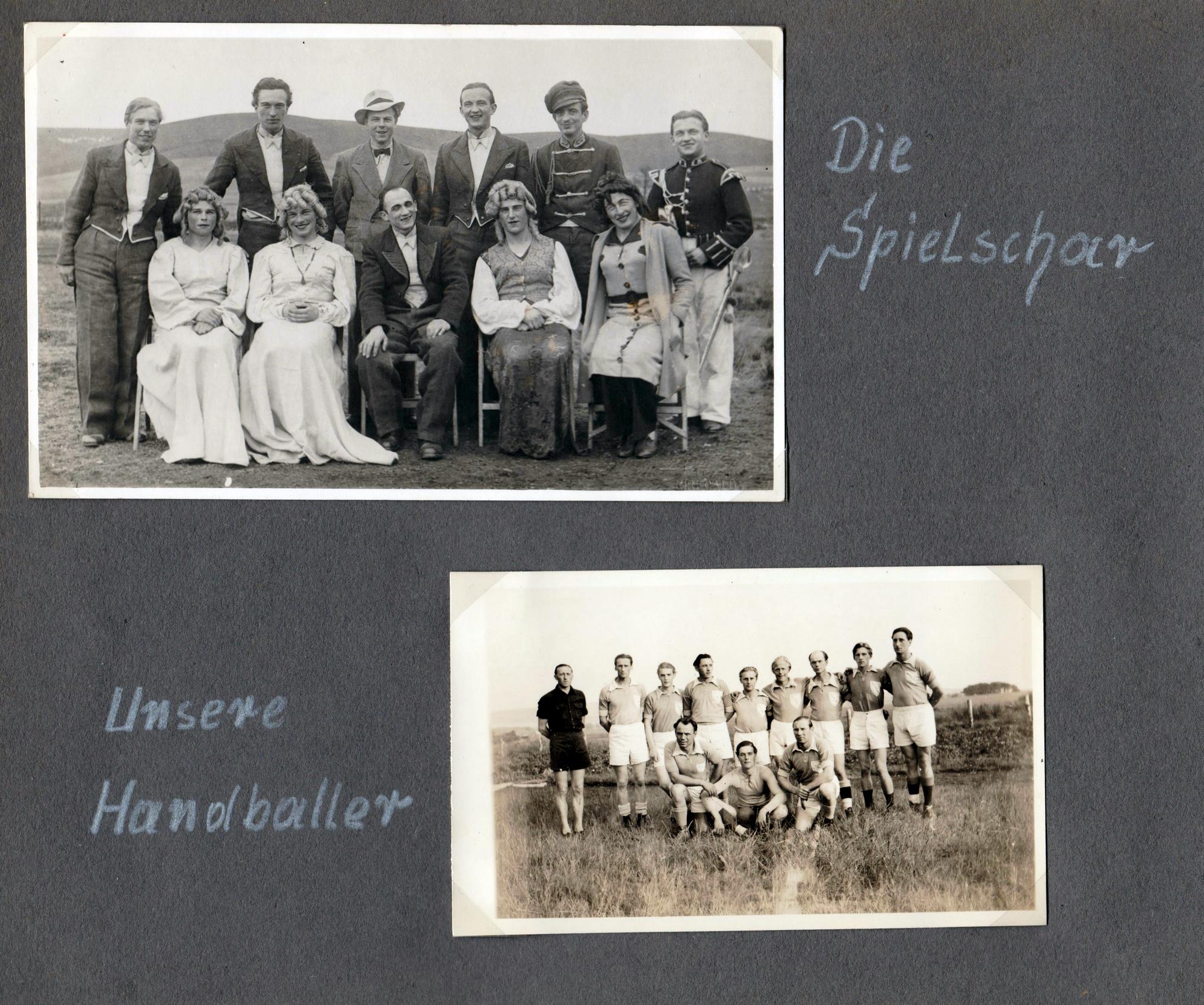
Plate 10:
Top: inhabitants of barrack 7 in 1946 (Willi is the first at the left in the front row)
Bottom: the football team
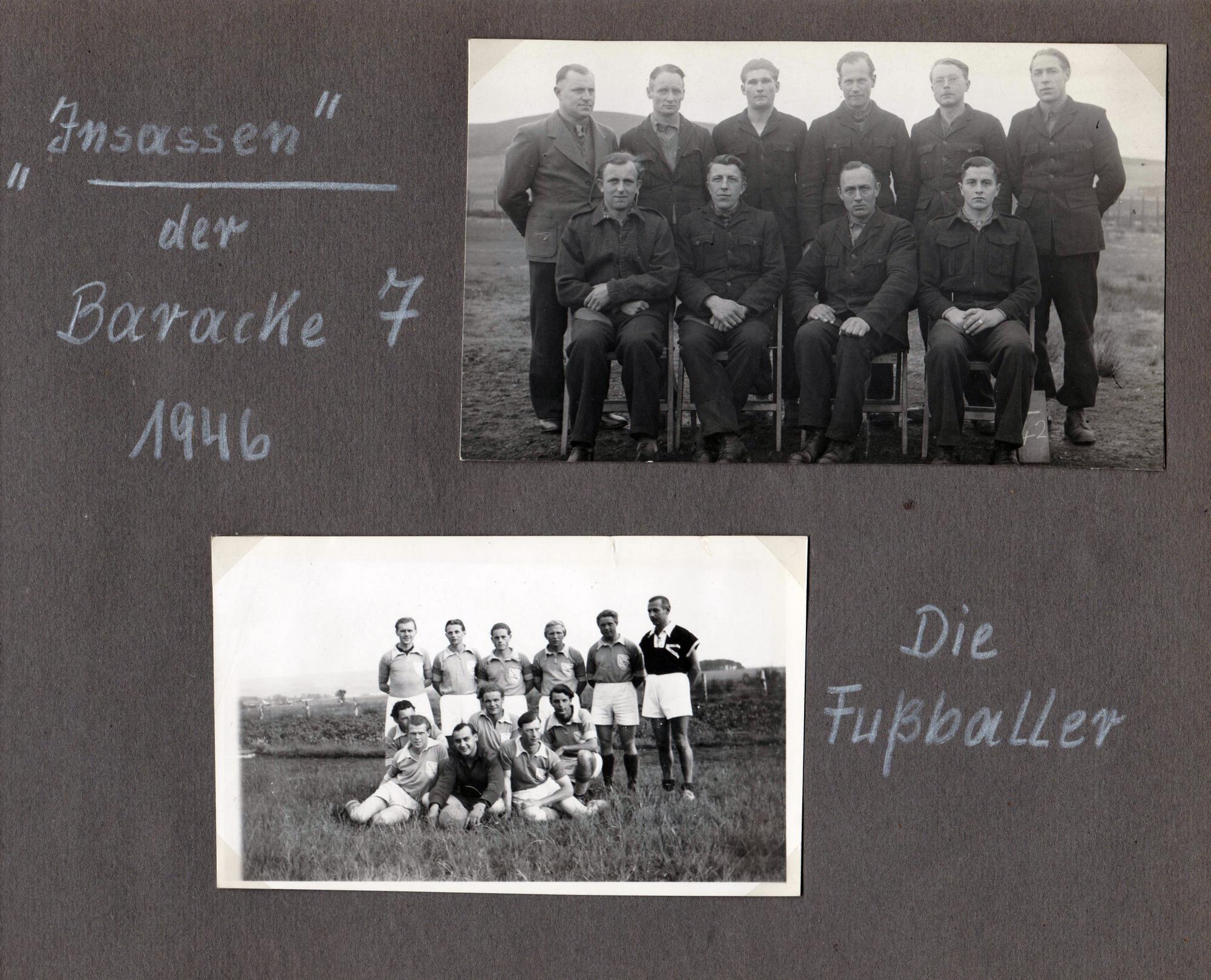
Plate 11:
Wedding pictures of Willi’s friends Walter Neugebauer and Eberhard Schneider (married 27th September 1948)
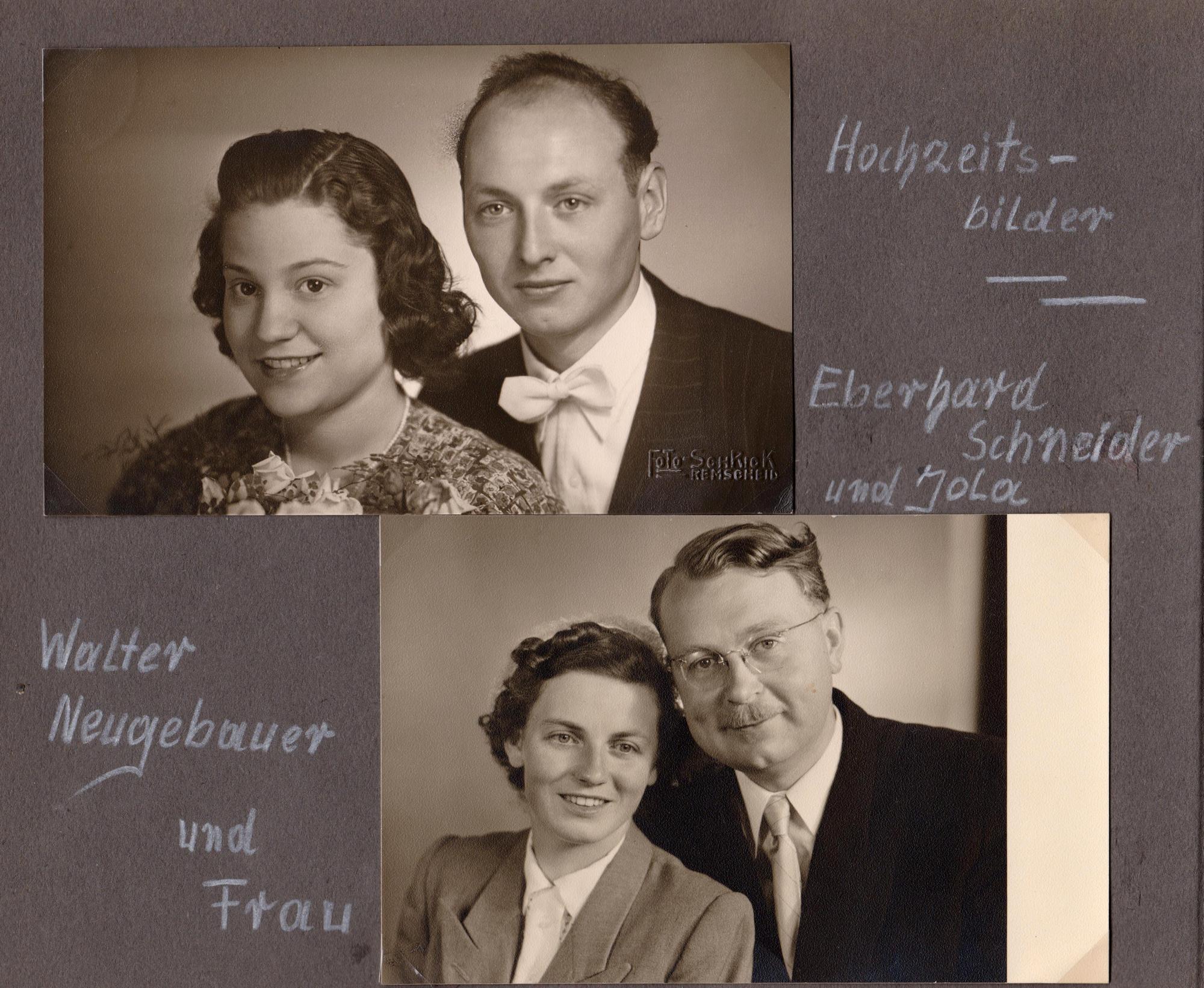
3 POW post letters from Willi to his parents (two from Cumnock and one from Laurencekirk):
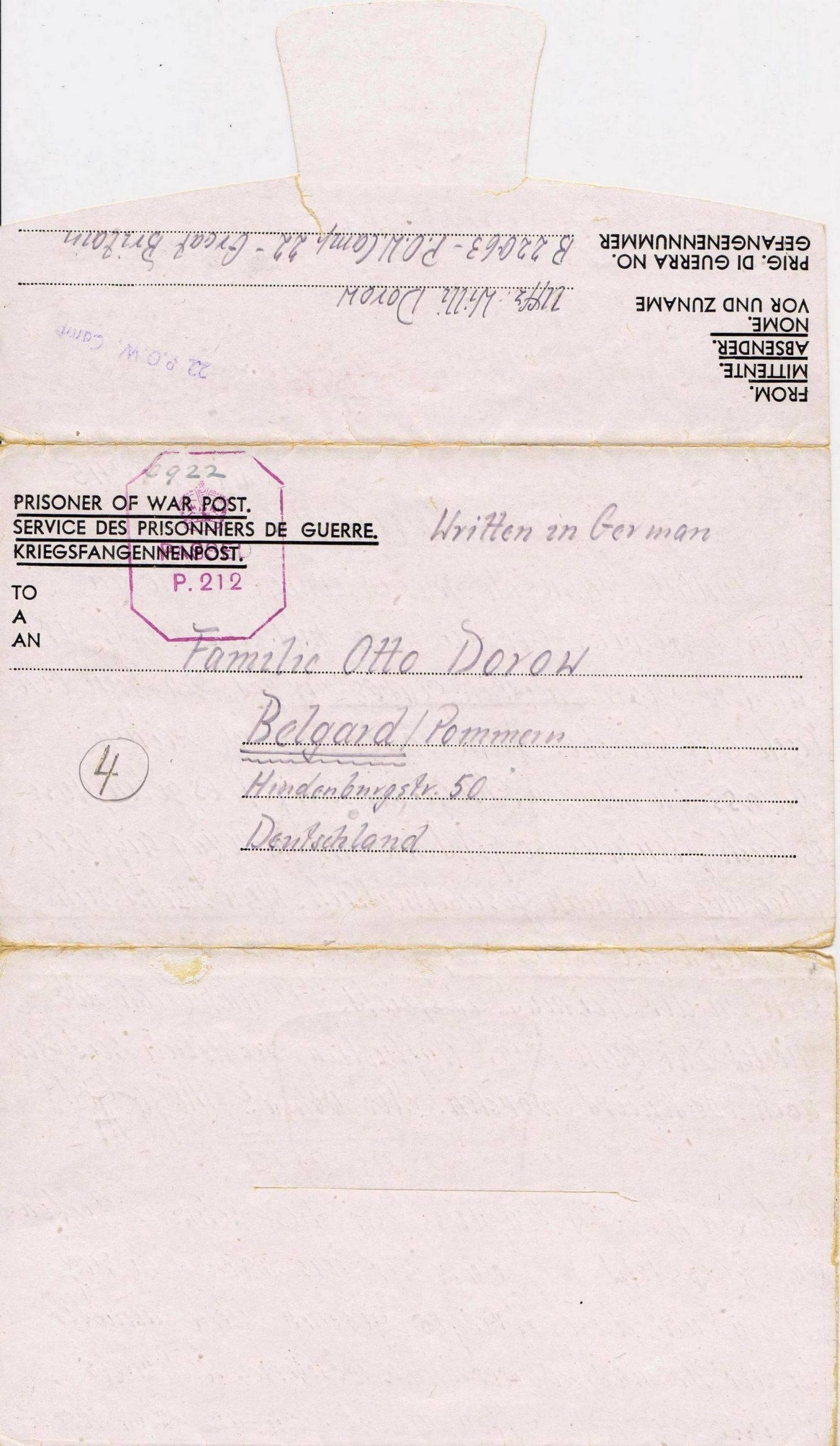
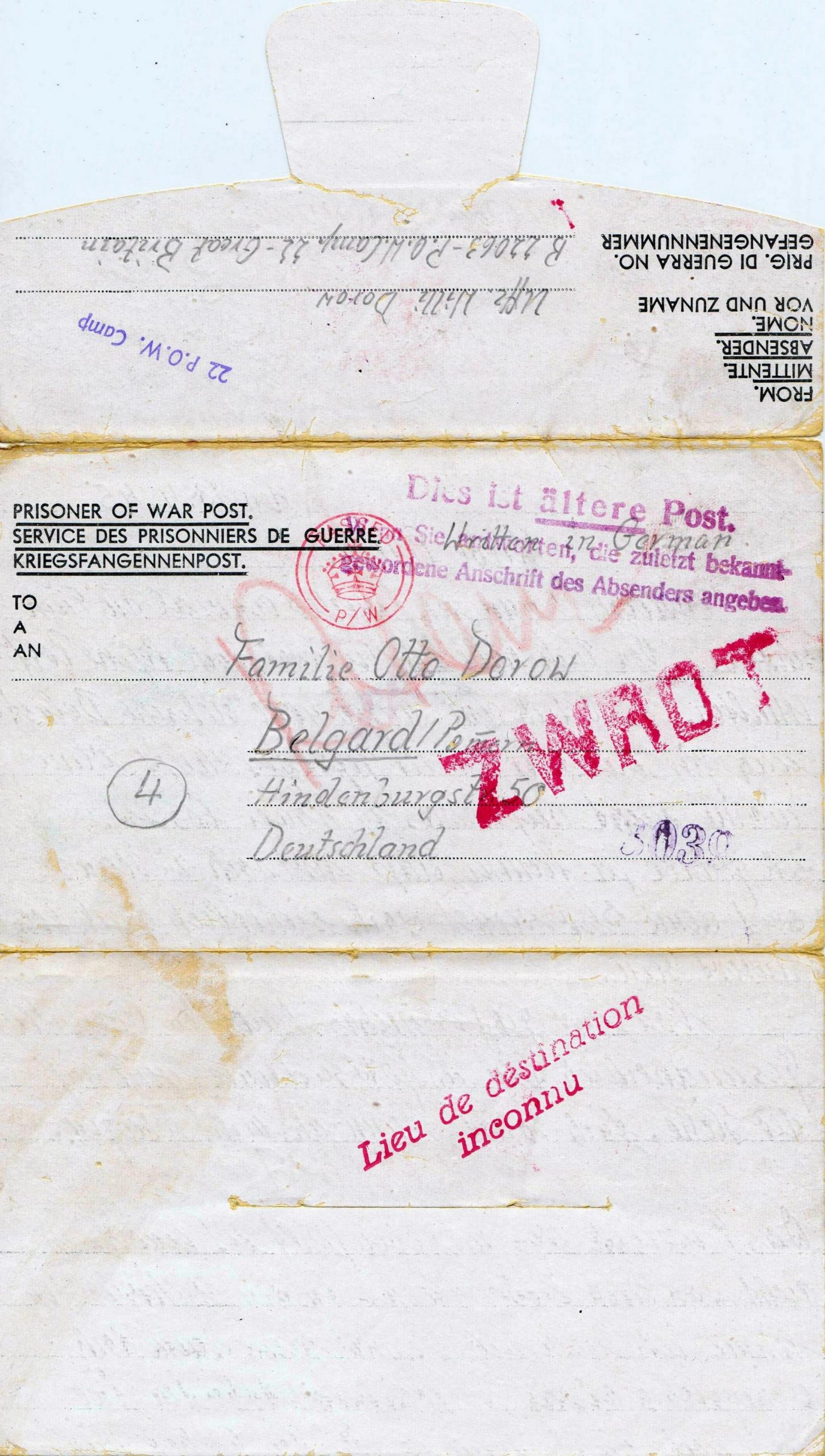
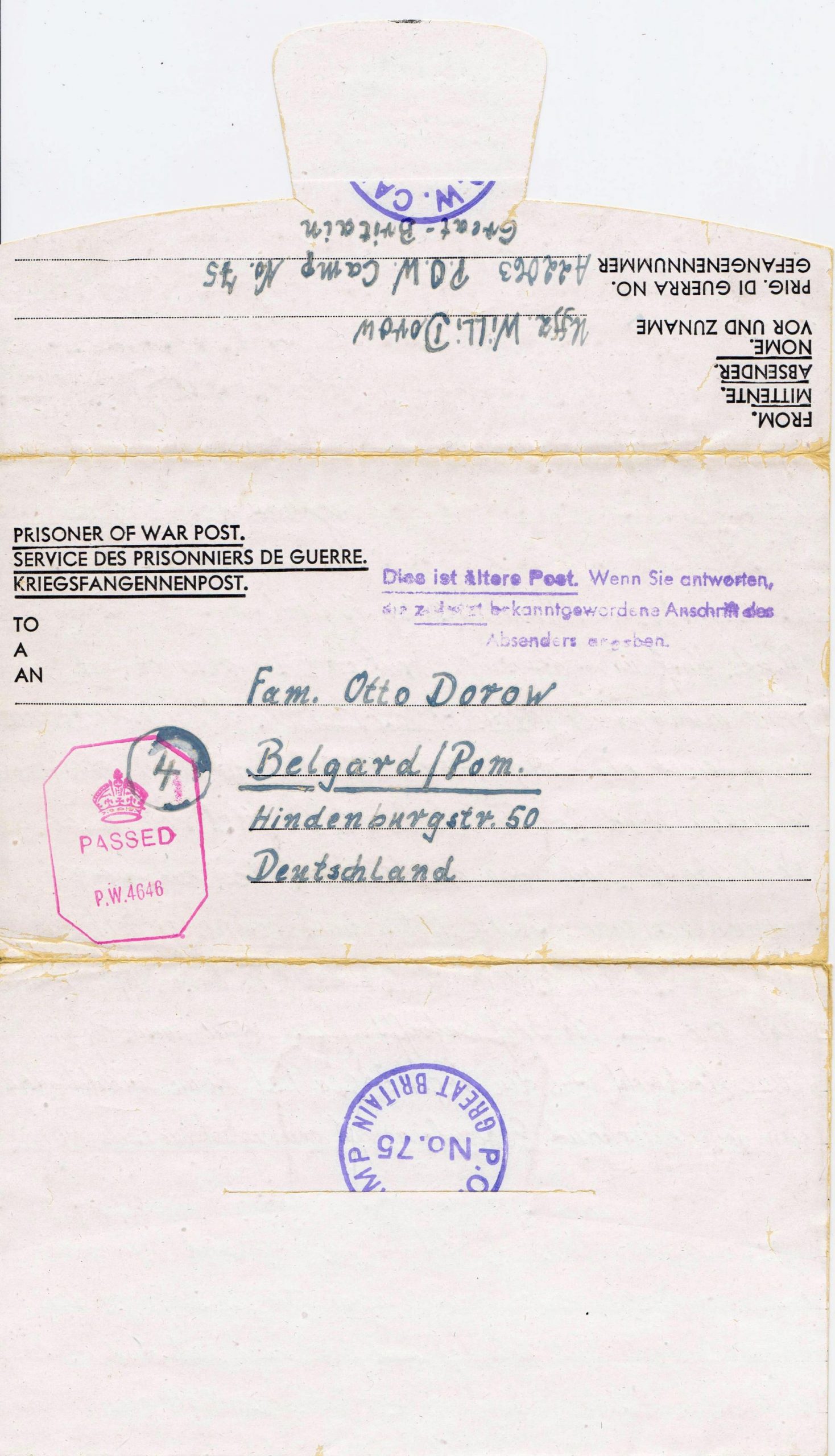
Medical examination records:
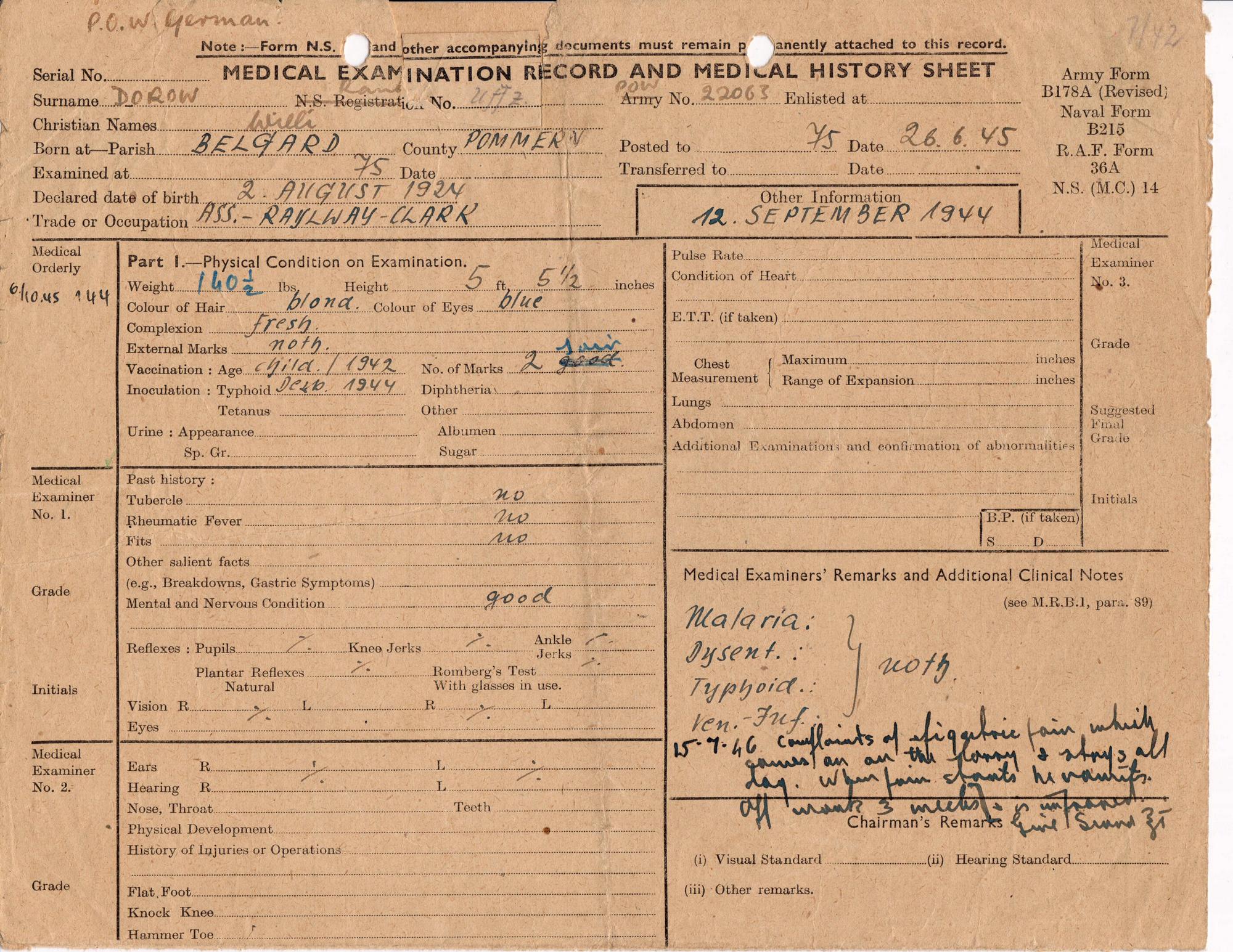
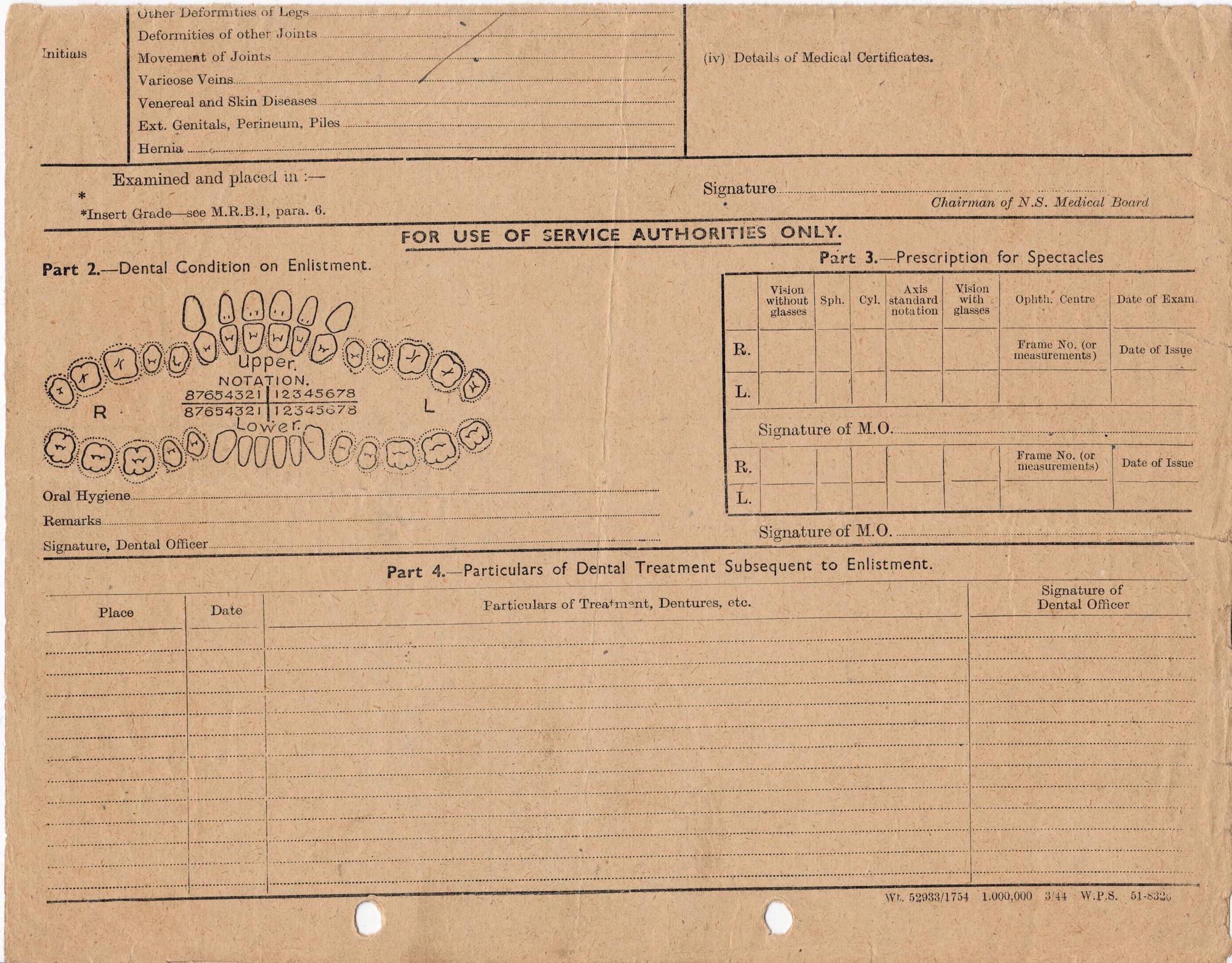
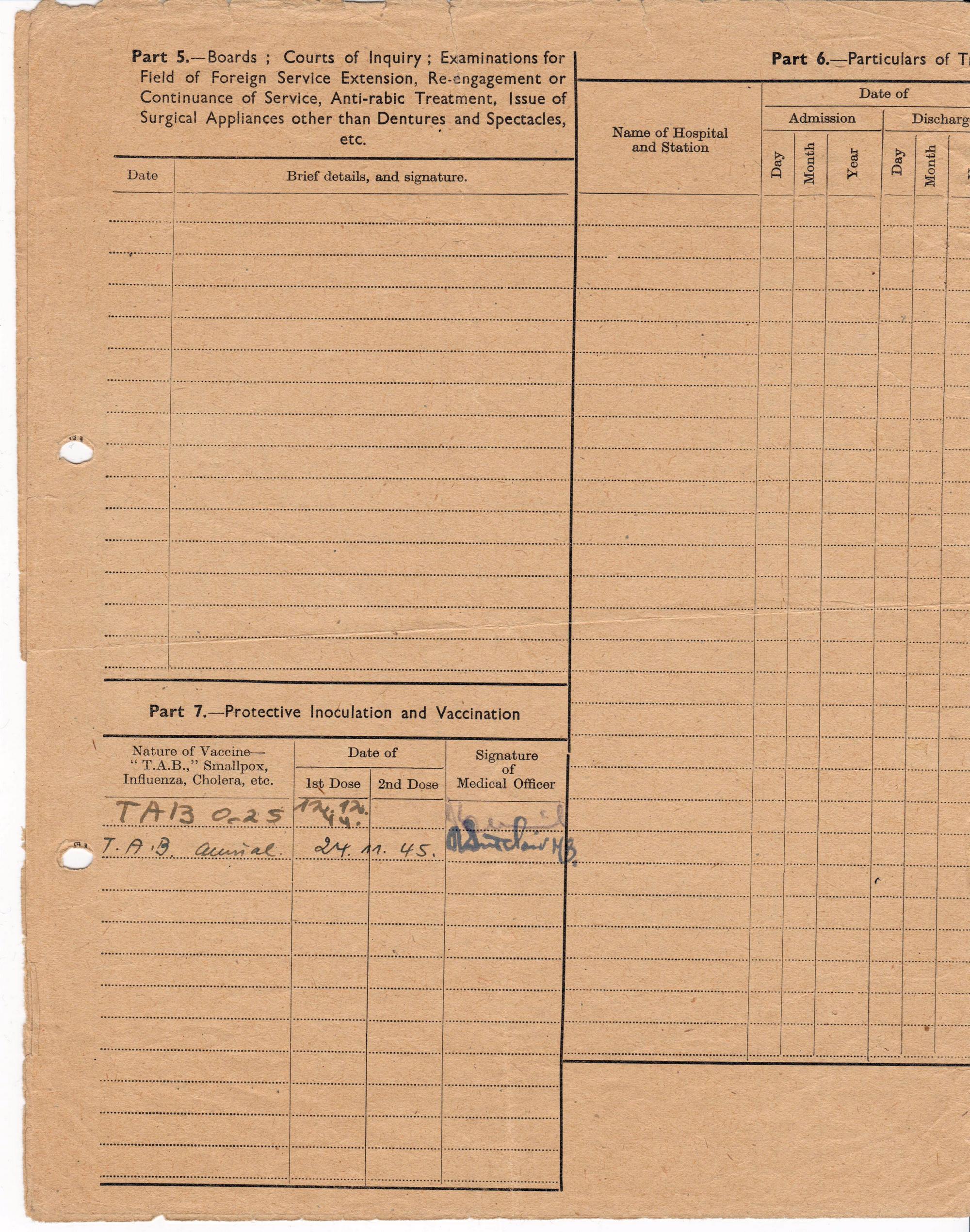
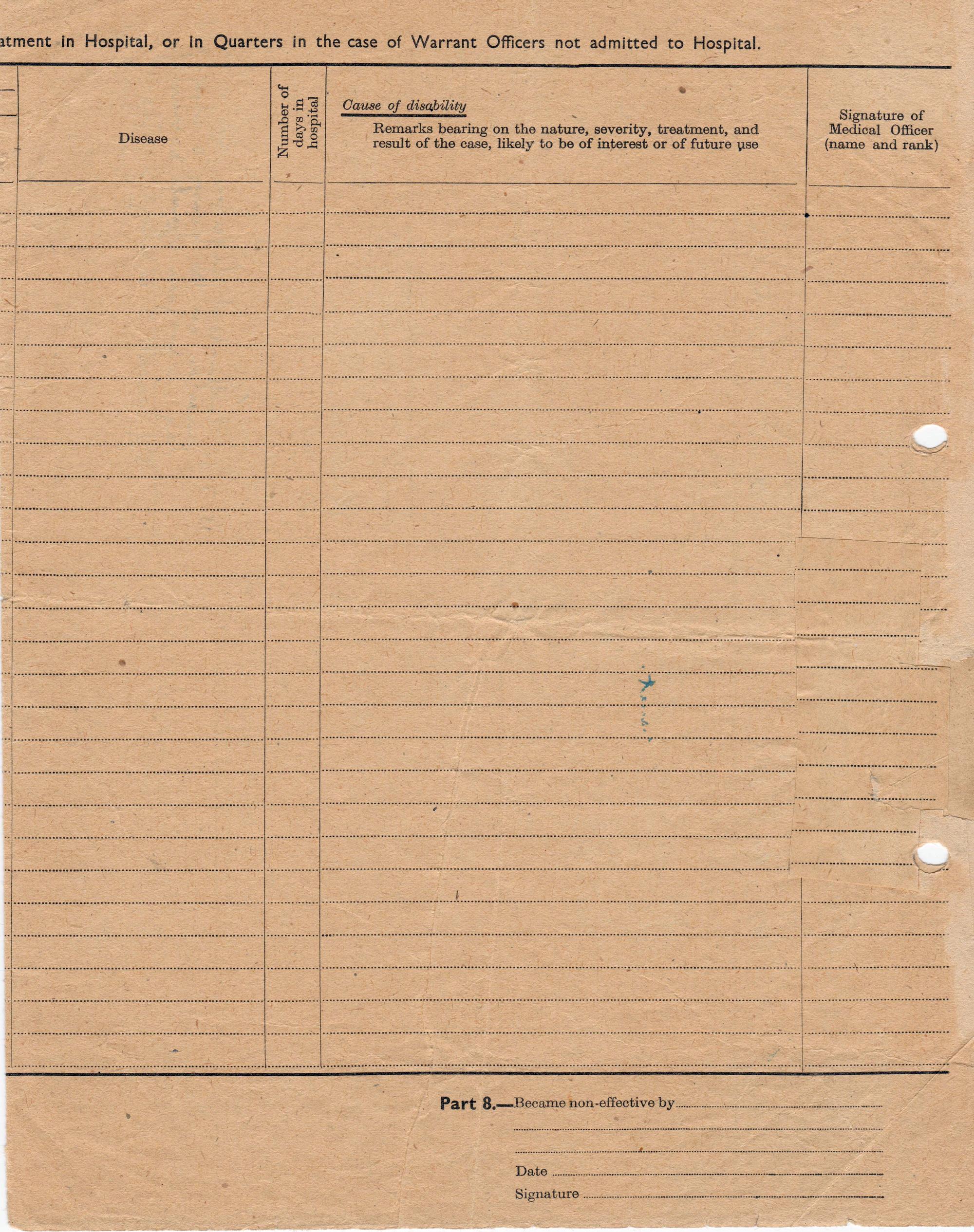
Medical diagnosis sheet:
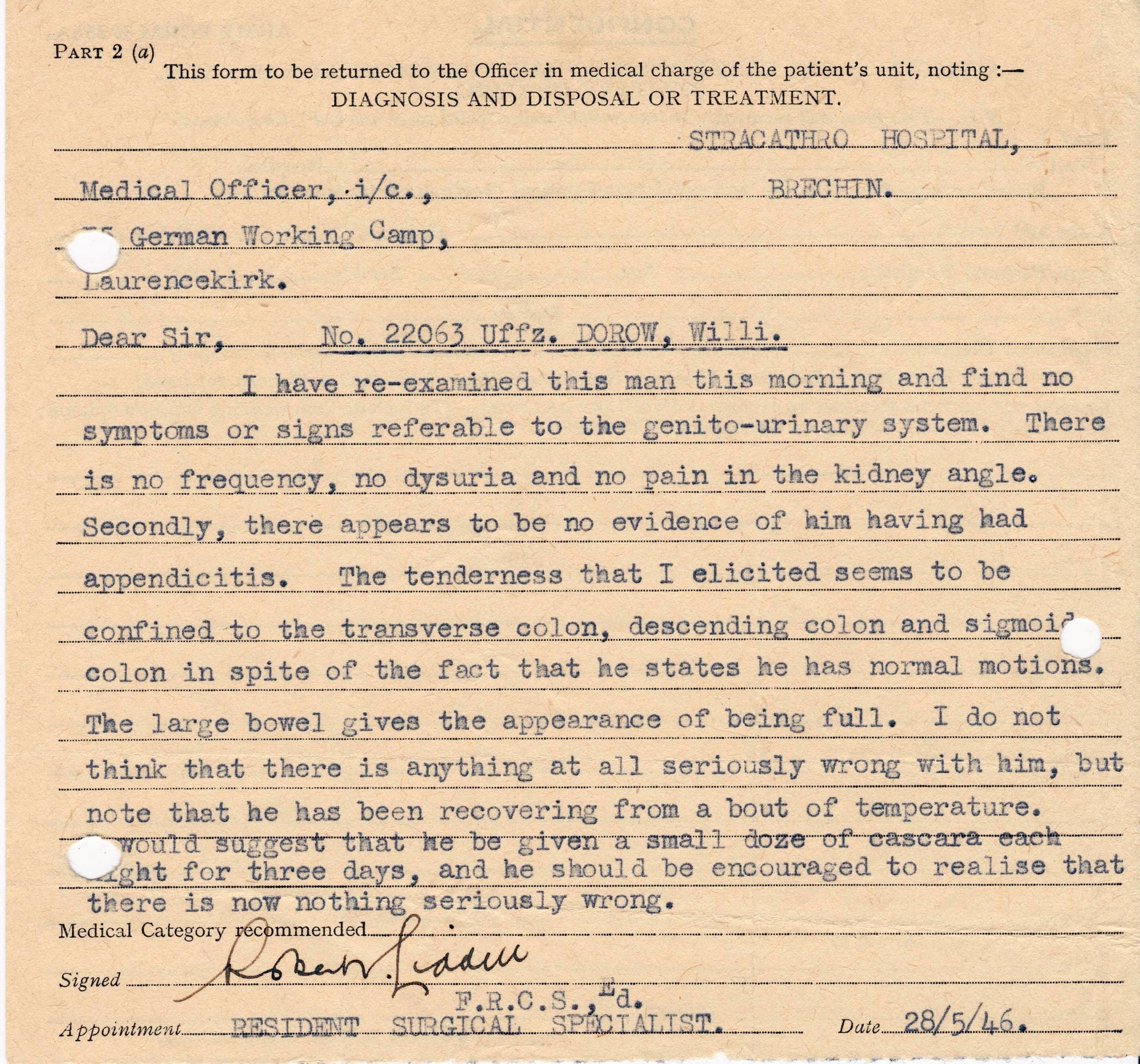
Sick certificate:
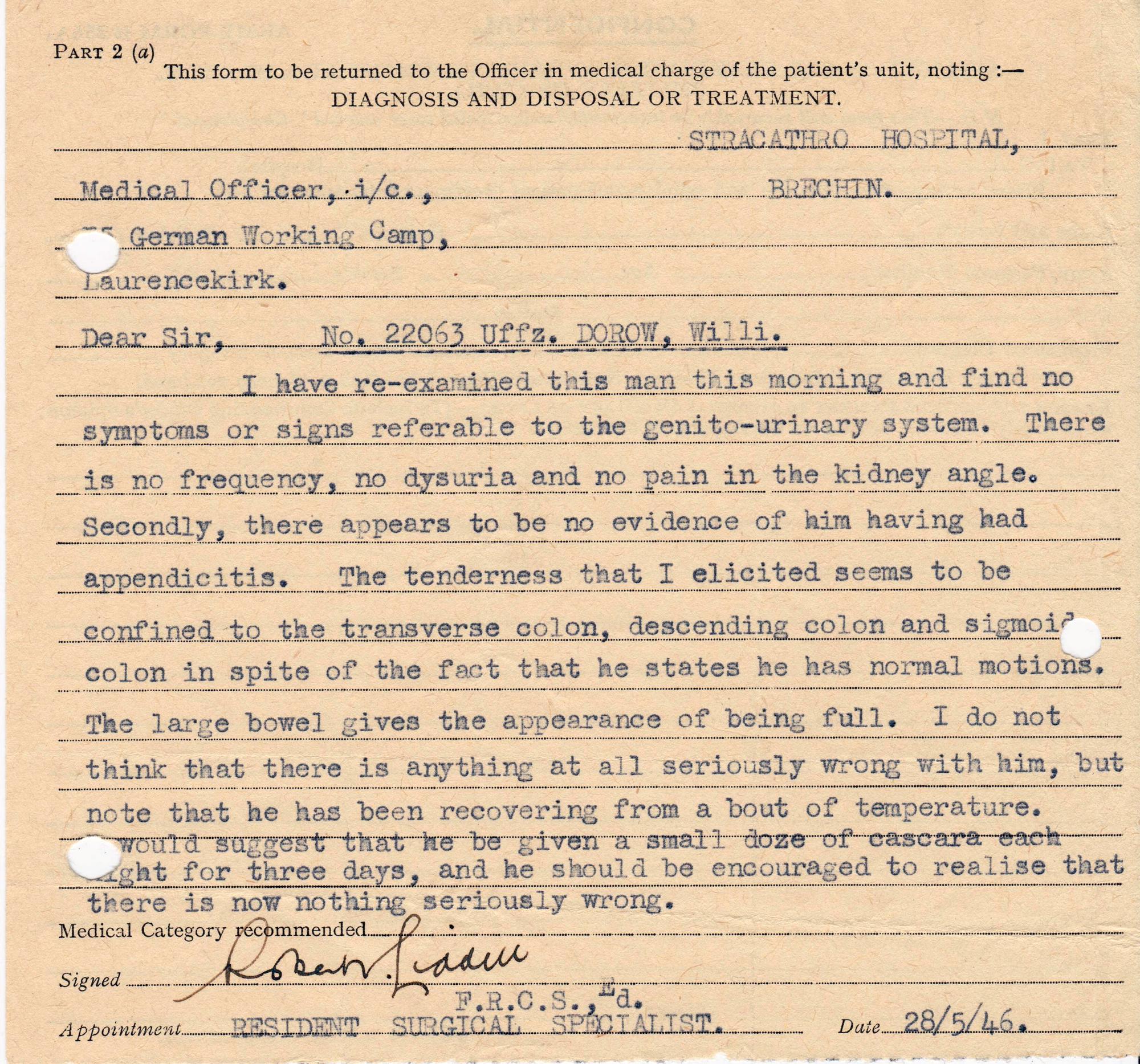
Certificate of Discharge:
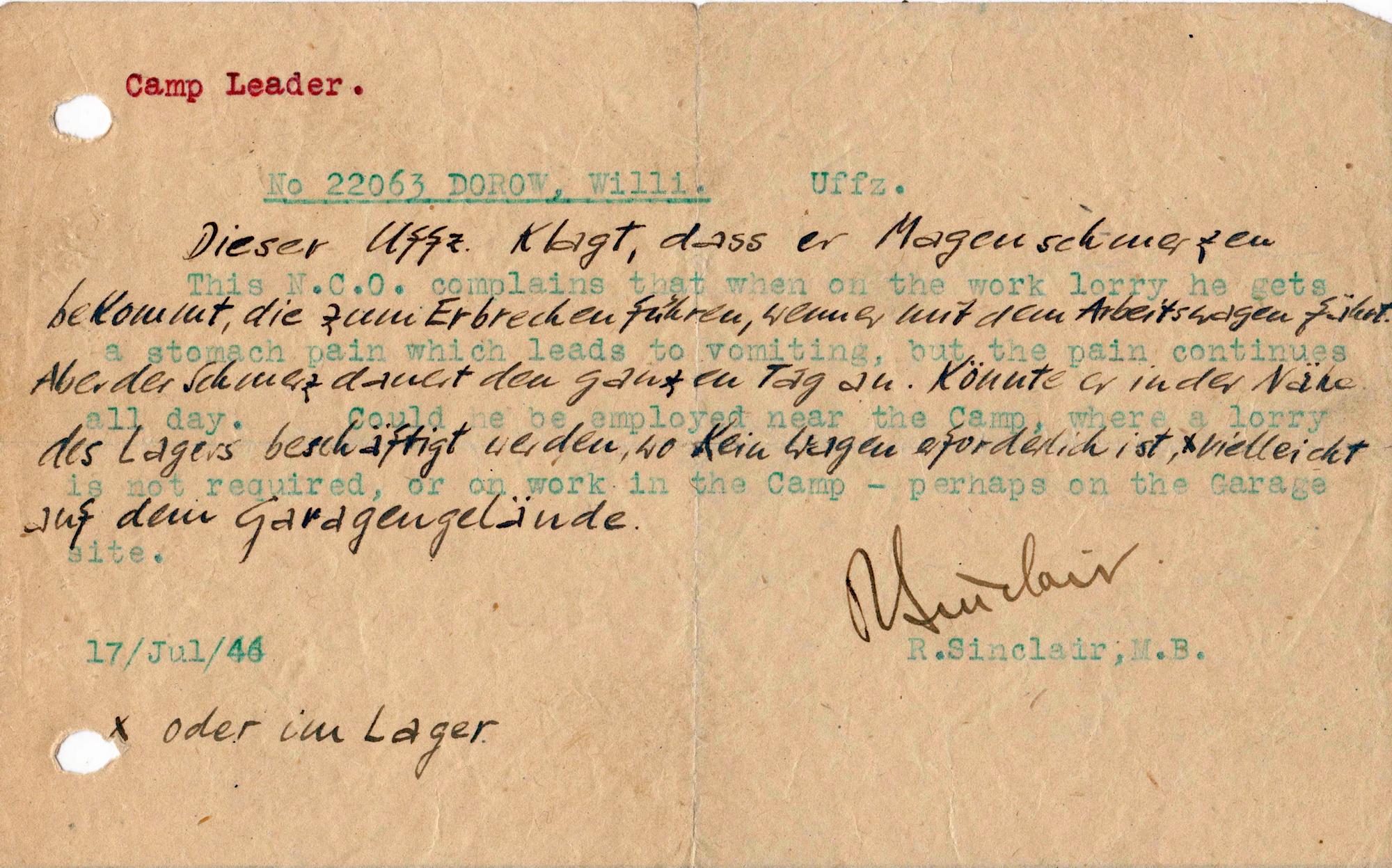
Willi and Edith Dorow in 2014:
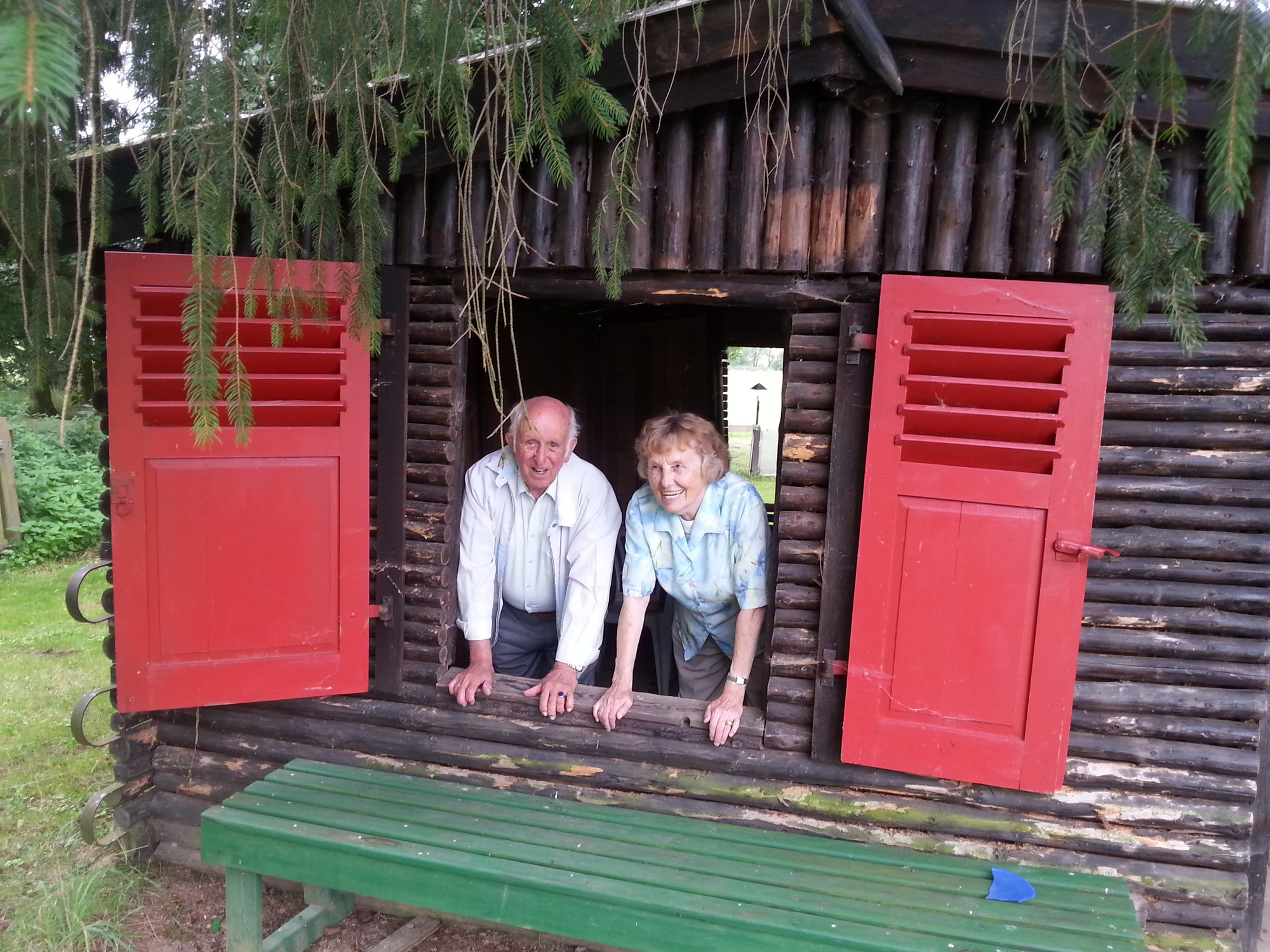

A brilliant presentation of one man’s involvement in the great war, so often depicted on the front line. While sharing an insight into the ‘local’ roles.
While personally researching some family history, I am understanding how little I know of my family history and indeed their involvement over this time. I do wonder if my grandmother as a ‘landgirl’ may have enjoyed Willi’s sense of humour? Thank you for taking time to compile this and indeed for sharing it.
Hello,
are there any more photos from the P.O.W. Camp? My grandfather was a prisoner of war from 1945-1947 and his letters have “P.O.W. Camp 75 North hillcamp Laurencekirk Kincardinshire” as the return address. In his letters to my grandmother, my grandfather describes having been a member of the amateur dramatics troupe.
I would be very pleased to hear from you.
Thank you and best regards
Florian Birch
Hi Florian,
unfortunately I have no more photos. Do you know the excellent books North East Scotland at war I + II (2018 + 2021) by Alan Stewart? Maybe Alan can also help you with further contacts. A few pictures you find in https://www.koks-gas-teer.de/peter.html
Best regards
Wolfgang